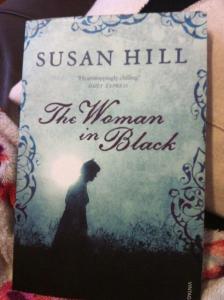My latest read was fuelled by a desire to conquer my fear, a genuine attempt at tackling one of my long-standing fears head on. So I read The Woman in Black by Susan Hill.
Firstly let me clarify that I have had a fear of The Woman in Black since I was 16! My first encounter was seeing the play at the theatre with the rest of my Drama class. As much as I could tell you what an amazing performance it was, and how the minimalist effects were perfectly executed- it was so much more. It was an outstanding performance which has successfully cemented a fear in me of The Woman in Black. Just thinking about it makes me shiver, and afterwards I had nightmares for 2 months. Now that’s some performance!
Then there came the film with Daniel Radcliffe in the role of Arthur Kipps. Admittedly there are differences between the film and the theatre adaptations, but these were to be expected. But the film succeeded in re-instating my fear of The Woman in Black, and taking it to a whole new level. The film brought The Woman in Black’s dreadful and terrifying face right into my personal space- I must get round to writing a thank you card to the relative who bought me the DVD!
To this day there are parts of that film that I have not been able to watch, simply because I was able to watch the sequence leading up to it, and then my nerves gave out and the cushion moved in front of my face, so fast it’s become a permanent reflex whenever The Woman in Black is mentioned.
It wasn’t until I saw my brother with a copy of Susan Hill’s novel The Woman in Black, that I then realised that both the film and theatre productions are adaptations from an existing work; therefore I’d done it all backwards!
So moving on to my most recent encounter with The Woman in Black….Susan Hill’s novel was much more subtle and eerie than I imagined. She successfully depicts the drab and desolate Eel Marsh House so poignantly that it’s an image hard to forget.
I didn’t know what else to expect from the novel, but I enjoyed the reminiscent ‘retelling’ perspective. Whatever horrors the story revealed, there was a survivor, able to tell the harrowing tale in great detail.
Somehow when reading Kipp’s tragic story, it hit me much harder than it did when I saw the play or film- and don’t forget the film ends completely differently to the book. Hill shows literary skill in creating such an ordinary character, whose life bears no resemblance to my own; and yet throughout the novel I cared for him. I cared for his welfare; for his sanity and for his family; almost as much as I care for my own.
What many readers forget in heavy action or mystery novels are the easy to miss, mundane and everyday occurrences. But rather than skip these events, Hill uses them to build her readers a solid picture of Arthur Kipps; giving us a reliable and believable centre for the plot. The relating of normal, everyday events makes the supernatural events starker than they would have been if the entire novel was littered with them. In fact I was surprised by the end, when you count the relatively few encounters Arthur Kipps has with The Woman in Black, the affect those encounters had not only on Kipps but myself as well…if you’re not even slightly shaken by the retelling of Kipp’s story, then you’re made of stronger stuff than me.
I did find the ending a little bleak as it seemed to just tail off into nothing. It did end for Mr Kipps at least, that much was clear. But it was a little abrupt; it’s not quite a cliff-hanger so there’s no build up or expectation for a second novel; but you don’t get much satisfaction in it either. I suppose I shouldn’t have expected more from a thriller/ horror novel, but I did want more for poor Mr Kipps.
Did reading the novel put my fears to rest? Well not so much, for a few nights I was jumpy amongst the hallway shadows. But I did feel I understood Arthur Kipps and his story much better, and enjoyed the experience whilst reading it. Those chapters which delved into the back story of The Woman in Black were fascinating, I simply wanted to get to the bottom of the mystery- I wanted to be able to put her spirit to rest. When a book can give you the same chills as a play or film, then you know you’re onto something good!
© Gemma Feltham, 25th July 2015



































You must be logged in to post a comment.